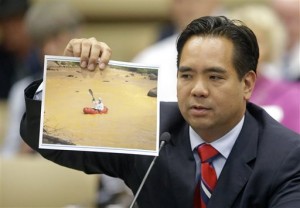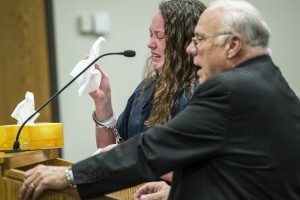Policy changes and breaking news affected the Utah community while many students were home for summer vacation. Here’s a quick recap of some of the most important events.

Prison moving to Salt Lake City
After a summer of visiting potential prison building sights, witnessing protests by residents and debating about the possibility of renovating the Draper prison, the Utah State Legislature’s Prison Relocation Committee recommended that a new prison be built at a site west of the state International Airport.
Following the recommendation, the state legislature passed HCR101 in August, officially designating the site as the preferred new prison spot. Gov. Gary Herbert then officially signed the resolution, turning it into law.
But, the fight to keep the “joint at the point,” isn’t over.
Mayor Ralph Becker and other Salt Lake officials are currently meeting with lawyers to challenge the prison relocation via lawsuit, claiming that besides Salt Lake residents not wanting the prison, the Salt Lake site is unable to sustain the prison.
Construction crews will have to remove wetlands before building the facility, an upfront cost that would have been unnecessary for other considered sites in Eagle Mountain, Fairfield and Grantsville.
However, placing the prison in Salt Lake projects $248 million in long-term savings when compared to the Eagle Mountain site. The majority of these savings are expected to come from the Salt Lake site’s closer proximity to courts, hospitals, employees and other personnel and volunteers.

(AP Photo/Rick Bowmer)
Utah defunds Planned Parenthood following scandal
Following the release of videos containing Planned Parenthood officials discussing the sale and purchase of aborted fetal tissue, the nonprofit organization was accused of profiting from the harvesting and selling of fetal body parts.
Under federal law, organizations similar to Planned Parenthood may only recover their expenses with the sale of fetal organs to research facilities if the woman who bore the fetus signed a consent form.
In August, Gov. Gary Herbert defunded the Utah locations of the nonprofit organization by instructing state agencies affiliated with Planned Parenthood to withhold federal funds that are designated to the health services clinic.
The governor — along with Reps. Mia Love, R-Utah, Curt Bramble, R-Provo and other Utah County legislative officials — also joined a Planned Parenthood protest at the State Capitol with nearly 300 other people, calling for Planned Parenthood to be defunded on a national scale.
Besides providing abortion service referrals, the taxpayer-funded organization also provides STD testing and treatment, exams for women, and sexual health education.

Colorado mine spill contaminates Utah water
An accident at the Gold King Mine in Silverton, Colorado, in early August spilled three million gallons of water contaminated with lead, arsenic, zinc, mercury and cadmium during a blowout, creating a yellow sludge that traveled down the San Juan river to Lake Powell in Southern Utah.
The accident was caused by an Environmental Protection Agency team as they tried to enter the mine area, which they knew was at risk for a blowout, instead of treating and pumping the contaminated waste water within the mine.
After visiting the site of the mine accident, Utah Attorney General Sean Reyes said there will be legal recourse if the EPA is not held accountable for injuries and damages caused by the accident.
Short-term effects from the spill included recreation area closures and the National Park Service recommending that people enjoying the outdoors in the area bring their own water with them, instead of filtering the river water.
A potential long-term effect is fish becoming contaminated with mercury, making it unsafe for human consumption.
Legislators tighten seat belt requirements
As of May 12, not wearing a seat belt is a primary offense in the state of Utah. Law enforcement officials can now pull over and ticket people who are not wearing their seat belts either while driving or riding as a passenger.
Prior to the law being passed by the Utah State Legislature in March of 2015, adults above the age of 18 could only be cited for not wearing a seat belt if they were being pulled over for another reason.
Potential sales tax increase on the ballot
On Aug. 18, Utah County commissioners approved for a resolution on the November 2015 ballot, which, if passed by voters, will institute a sales tax increase to help fund transportation needs in the county. If the referendum passes, sales taxes will increase a single penny for every $4 a consumer spends.
The increase would equal about $50 per person, per year. Forty percent of the tax would go to the Utah Transit Authority, 40 percent to cities for road projects and the remaining 20 percent to the county to maintain roads and to create bike paths and trails.

Grunwald trial ends with prison sentence
Meagan Grunwald, 18, who drove the getaway vehicle after her 27-year-old boyfriend shot and killed Sgt. Cory Wride and injured another Utah County officer, was found guilty of aggravated murder and 10 other charges in early May. Grunwald, who was 17 at the time of the incident, claimed that she drove the vehicle because she was afraid that her at-the-time boyfriend would shoot her if she didn’t comply, but jurors did not believe her version of the events and determined that she acted intentionally.
BYU meth lab suspect sent to prison
In early July, former BYU student Bryce Cazier, 22, was sent to prison for 60 days and will serve a 36-month probation for the creation and operation of a fully functioning meth lab in his Riviera Apartment. Cazier denied the allegations, saying he was making soap, not meth.

Disappearance of Provo woman still unsolved
Despite the cash award for information about the disappearance of Elizabeth Salgado, 26 — a new-to-Provo resident from Mexico who disappeared on April 16 — police are no closer to finding the missing woman.
Fire started on Y Mountain
A Chinese lantern lit by a college-aged man started a fire that grew to approximately 2-acres on Y Mountain in mid-July. The flames reached up to 30 feet high and were visible from campus. Because of the location of the fire, fire fighting crews had to drop several 75-gallon pods of water via helicopter to extinguish the flames. A ticket with a minimum fine of $500 was issued to the man who confessed to lighting the lantern.




